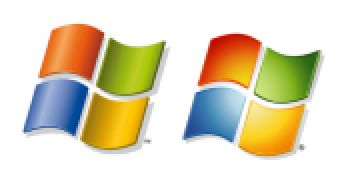It will be Windows 7 to do the job Windows Vista failed at, namely to kill Windows XP. However, killing XP is a process rather than a single moment in time. Windows 7 will first erode XP’s market share and convert its audience. As XP’s usage rate will drop, less and less hardware manufacturers and software developers will offer support and compatibility of the latest versions of their products for the operating system Microsoft released in 2001. It will be Microsoft to hammer down the last nail in the XP coffin in 2014, when it will cut extended support for the platform entirely. At that time, users still running XP will be left to fend for themselves with no more updates, no more security patches, no more support.
A recent study from Gartner predicts that no less than 75% of corporate PCs will be running a 64-bit version of Windows by 2014 (via DailyTech). Such a scenario automatically implies that enterprises are now ready, and increasingly so, to discard Windows XP and 32-bit machines, for Windows 7 running on new 64-bit architectures which can take advantage of in excess of 4 GB of RAM.
"On the surface, it would appear that the most obvious time to perform a move from 32-bit to 64-bit would be during an operating system migration (such as from Windows XP to Windows 7). Many companies feel that, if they don't make the move now, they may have to wait until Windows 8 or potentially Windows 9 before another opportunity arises. They point to the complexity involved in supporting an additional set of images as a reason to make an all-or-nothing move,” Gartner noted.
With Windows 7, as with Windows Vista, Microsoft is offering both x86 and x64 versions of the operating system. However, the Redmond company is unlikely to continue doing so with future versions of Windows. Whether Microsoft will cut support for 32-bit processor starting with Windows 8 or not, it still remains to be seen. However, there’s little room for doubt that 64-bit is the future. In this context, having available x64 Vista and x64 Windows 7 side by side, it is clear that customers will opt for the latter to replace Windows 7.
Corporate IT environments are traditionally lagging home users in terms of adopting new technologies, including Windows. If by 2014, 75% of corporate computers will be running 64-bit Windows, most probably x64 Windows 7, it is possible a higher percentage of home users would have already upgraded from Windows XP. At the end of November 2009, XP accounted for a market share of 69.05% and dropping, Vista just 18.55%, also dropping, and Windows 7 4%, at just a single month after release.
"Corporate buyers need to establish a position on moving to 64-bit as part of their Windows 7 planning. For many users, moving to 64-bit with Windows 7 may be the right solution with respect to performance and support for new applications. However, others may find significant compatibility issues coupled with little to no benefit from making the shift at this time. Either way, all organizations must take steps to provide a basic level of support for 64-bit Windows 7, particularly for consumer-facing applications,” Gartner added.
With XP end of life in 2014, Windows 7 offers the best alternative for upgrade to customers, especially enterprises, that need to upgrade from XP. Businesses that will run XP until Windows 8 drops, in approximately three years, risk to have little time available to perform the transition, and to have to run XP even after Microsoft has completely cut support.
Microsoft Windows 7 90-Day Eval VHD is available for download here.
Another Windows 7 RTM Enterprise 90-Day Evaluation is available for download here.
Windows 7 RTM Starter Edition, 100-Screenshot Gallery
Windows 7 RTM Home Basic 110-Screenshot Gallery
Windows 7 RTM Home Premium 120-Screenshot Gallery
Windows 7 RTM Professional 110-Screenshot Gallery
Windows 7 RTM Enterprise 100-Screenshot Gallery

 14 DAY TRIAL //
14 DAY TRIAL //